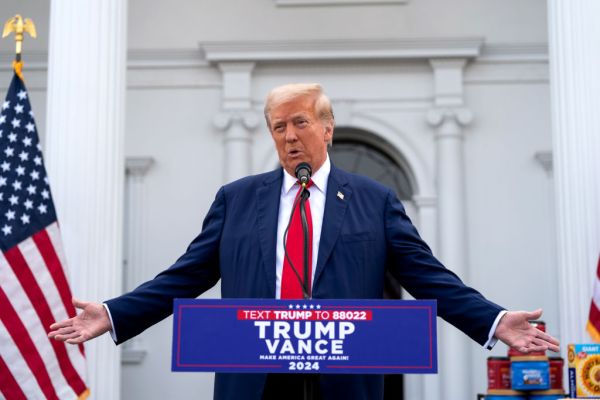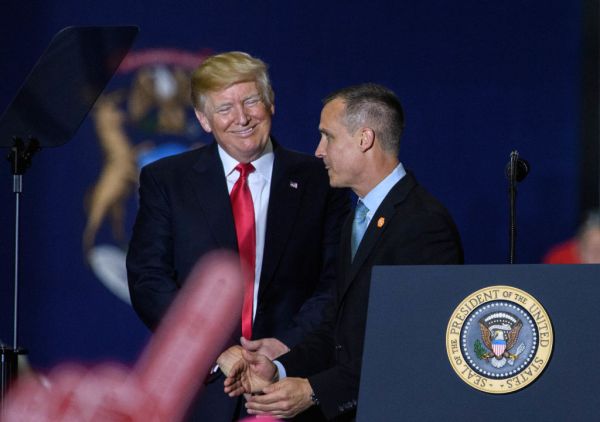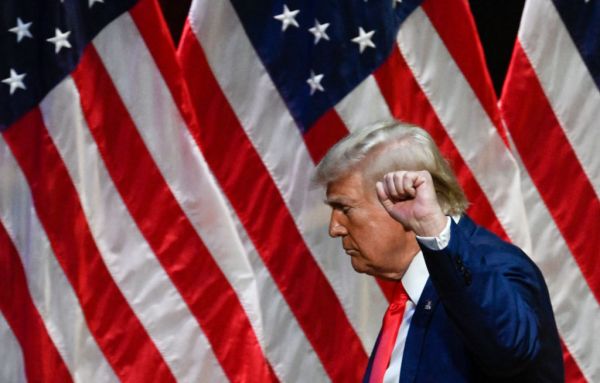Barack Obama’s return to the national stage on Tuesday night will mark 16 years of messianic politics in the United States. It didn’t used to be that way.
America has had many charismatic presidents, but in my lifetime the only one before 2008 who attained a degree of “national savior” stature among his supporters was Ronald Reagan. And Reagan himself was less the key to salvation within his movement than Reaganism was. The Gipper was an ideologue who believed smaller government, more so than his personal leadership, was the cure for what ailed America. As if to illustrate the point, his running mate became the only vice president in the past century to immediately succeed a two-term president by winning a term of his own. The Reagan revolution outlasted the Reagan administration.
A healthy country doesn’t need saving by messiahs. Messiahs are quick-fix solutions to serious problems; in lieu of the hard work of compromise and creative policymaking, all voters need to do is hand them power and watch the magic happen. The fact that each party has turned to one in the last 16 years is as ominous a symptom of America’s poor civic health as any other.
Historians will treat the rise of Obama in 2008 and then Donald Trump in 2016 as attempts by both sides to reorient an America they felt had been radically destabilized. After 9/11, the Iraq war, and the financial crisis, an exasperated left wanted dramatic change and didn’t see it in Hillary Clinton, a dreary technocrat and quintessential establishmentarian. To rescue the country from big, historic problems, they needed a big, historic figure.
They got that in the person of the first black president, a man with enough charisma and rhetorical skill to pack stadiums. Obama was “the one.” Like Reagan, he was an ideologue. Unlike Reagan he believed that the key to his appeal was his persona. “I serve as a blank screen on which people of vastly different political stripes project their own views,” he wrote, famously.
It turns out that messianic personality cults aren’t great for actually winning elections.
The roots of Trump’s messianism are less clear, but the essence of the “Flight 93” logic that sent him to victory in 2016 was that America was so close to irreparable disaster that only a radical rescue attempt could prevent it. Charitably, his support was driven by voters from deindustrialized “flyover country” desperate to find a savior who’d put a stop to bipartisan “globalism.” When Trump told them “I alone can fix it,” they believed him. Why wouldn’t they? No one else seemed interested in doing so.
Less charitably, his support was driven by Republicans’ sense that the country was “getting away” from them demographically. They’d lost the popular vote in every presidential election since 1992 save one; they’d watched leftists celebrate an “emerging Democratic majority;” they’d just spent eight years being governed by a black man and were facing the prospect of four more being governed by a woman. The Democratic Party was steadily moving left on illegal immigration too, which promised to accelerate the demographic upheaval.
Trump, the candidate of white identity politics, seemed willing to put a stop to all of that, unapologetically. He would restabilize America by reasserting the traditional majority’s right to rule.
As would-be national saviors, he and Obama were phenomenally popular among their respective admirers. Yet both were a total disaster for their parties down ballot.
It turns out that messianic personality cults aren’t great for actually winning elections.
What Obama and Trump have in common.
The problem with having your party led by a national savior is that national saviors tend to be parties unto themselves.
In addition to enjoying the usual support from rank-and-file partisans, they have their own separate following among low-propensity voters who have been captivated by them specifically. The first group will loyally show up for elections regardless of whether the savior is on the ballot, but the second will not—and no wonder. If you’ve elected a messiah in the belief that he’ll fix everything, why would you need to vote in a midterm?
The most striking commonality between Obama and Trump is how each drove high turnout for their parties when they were on the ballot yet couldn’t replicate that turnout in off-year elections when they weren’t. The second group simply didn’t show up. With Obama leading the ticket, Democrats routed Republicans in 2008 and 2012. With Trump atop the ballot, Republicans won total control of government in 2016 and came shockingly close to winning it again in 2020.
But both men failed catastrophically in midterms. Trump’s party was crushed in House races in 2018 and managed the worst off-year performance in 20 years in 2022. Obama’s party saw historic House losses in 2010, endured a Senate disaster in 2014, then watched his handpicked presidential successor lose a supposedly unlosable race to Trump in 2016. Obama’s record in state legislative races was even more gruesome. “The whole Democratic Party is now a smoking pile of rubble,” Matt Yglesias marveled in his 2016 election postmortem.
For all the adulation they enjoy, national saviors also tend to inspire strong feelings of fear and envy in their enemies, which keeps the opposition’s motivation to vote high. Modern American politics runs on negative partisanship, and hatred of the other side’s savior is rocket fuel for it. Because the savior represents a form of radical change, he occupies an outsized amount of mental real estate in his opponents’ collective imagination. Those opponents turn out in midterms even if those captivated low-propensity voters I mentioned earlier do not.
Given Obama’s midterm record, is it any wonder that Democrats turned to old hands like Clinton and Joe Biden to succeed him as their nominees for president? Years of defeat down ballot extinguished many promising young liberals’ careers, leaving the party with no bench. It’s taken two terms removed from his presidency for Democrats to rebuild a promising farm team.
And they’ve done so partly thanks to Trump, whose own messianic influence on the right has helped some Democratic up-and-comers to easy midterm victories in races that should have been tight. Josh Shapiro and John Fetterman might not be the two most powerful politicians in Pennsylvania today had Trump and his movement not rallied behind Doug Mastriano and Mehmet Oz, respectively, in 2022. With a few notable exceptions like J.D. Vance and Ron DeSantis, it’s the GOP that now doesn’t have much of a bench with national potential.
One wonders, in fact, how much of the electoral volatility of this era might have been avoided if only the parties had chosen leaders who are less likely to threaten the other side with their charisma. Like, for instance, Joe Biden.
Biden is the least charismatic leader since the first George Bush, which I’ve always suspected was a secret ingredient of why Democrats overperformed in the 2022 midterms. When a party is led by a messianic personality like Obama or Trump, it’s inevitable that a voter’s antipathy to them will trickle down to their party’s candidates down ballot. Both men have strong political “brands;” if you ran for office under their banner, you carried that brand for better or worse.
Joe Biden has no “brand.” He doesn’t define his party the way Obama and Trump have. He’s barely even present anymore. One might judge Obama a socialist or Trump a fascist and presume that any candidates they endorse share those sympathies, but Biden’s problem has never been ideological. It’s that he’s too old. And being old and incompetent isn’t something that can be held against younger Democrats.
Biden isn’t a savior. He doesn’t represent any sort of radical break with tradition (quite the contrary), and so he doesn’t threaten—or motivate—either side. That was a problem for him this fall, with the messianic Trump on the ballot, but an advantage to his party in 2022. I doubt it’s a coincidence, either, that Biden was unusually accomplished for having served just four years in office. The less charismatic the president is, the more political space there is for members of his party to get creative with bipartisan legislative compromises. Ask Joe Manchin and Kyrsten Sinema about that.
If you think American government would benefit from Congress reclaiming its policymaking power from the president—and since you’re a Dispatch subscriber, you probably do—then you should not want national saviors in the Oval Office. Yet that’s all we’ve had since 2009, and we might have another four years of it yet.
Where Obama and Trump differ.
Although the two produced similar electoral results, it’s unfair to Obama to compare his messianism to Trump’s and unfair to Trump to compare his messianism to Obama’s. Trump is a more consequential figure—and a much more pernicious one.
He’s remade his party in his image to a vastly greater degree than Obama did. Obama turned out to be the same sort of neoliberal that the left disdained Hillary Clinton and Joe Biden for being, enough so to have chosen Biden as his vice president and Clinton as his secretary of state. His great accomplishment in office was a reform to health insurance access that bore a suspicious resemblance to Mitt Romney’s program as governor of Massachusetts. Nothing in Kamala Harris’ agenda—to the extent such a thing exists—represents a dramatic break with the pre-Obama Democratic agenda.
Trump has turned the GOP upside down by comparison. It’s become a protectionist, quasi-isolationist, authoritarian party, unrecognizable from a decade ago. It’s not even pro-life anymore at the federal level. He’s less a “blank screen” onto which voters can project their desires than someone who’s turned the Republican Party into a blank screen onto which he can project his own. In that sense, Trump has taken his stature as a would-be national savior much further than Obama did: If you trust me to save America, he’s said to the right, you must support my policy instincts unquestioningly.
There was also no sense from Obama in 2008 that he hoped to replace longtime Democratic voters with those low-propensity voters who were enchanted by him specifically. He wanted to add that latter group to the Democratic coalition, but his messianism wasn’t so toxic that he preferred a smaller party that was more loyal to him to a larger one more capable of winning national elections.
Trump does prefer it. His political project is as much a matter of subtraction as addition, chasing away Republicans who prioritize the GOP’s political interests over his own and replacing them with those who won’t question his hold on power. Strategist James Carville described Trump’s habit of making war on members of his own party like Brian Kemp this way to Politico: “If a Democrat said, ‘I don’t want Bernie Sanders voters,’ even moderate Democrats would say ‘You’re out of your f—ing mind.’”
Here again, Trump exploits his stature as national savior in a way Obama did not. I can’t save America without complete obedience from the Republican Party, he means to imply. Right now in Arizona, Democrat Ruben Gallego is favored to win a Senate race because he gets to face Kari Lake instead of former Gov. Doug Ducey, who’s persona non grata in the GOP after refusing to meddle in the 2020 election on Trump’s behalf. Imagine Obama gifting the other party a Senate seat out of pure spite, something Trump has done repeatedly.
In fact, imagine how Obama would have handled losing the 2008 Democratic primary to Hillary Clinton. Is there any doubt he would have endorsed her for the sake of party unity ahead of the general election? Is there any doubt Trump would not have endorsed Ron DeSantis had DeSantis prevailed narrowly this year?
Of the two messiahs, he’s by far the more earnest radical. Obama was a creature of Democratic politics who shot to fame at the 2004 convention insisting that there are no red states or blue states, only the United States. His credibility as a national savior derived chiefly from his biography and the unusual mood of national instability in which he was elected, the right man at the right moment. His pretensions as a radical break with the past were largely superficial.
All Harris can offer as president is complete sentences and a semblance of politics the way it used to be.
Trump, on the other hand, came to the GOP as an outsider in 2016 and executed the equivalent of a hostile takeover. His pitch to voters has always been combative and exclusionary in ways that traditional politicians wouldn’t be comfortable with, from promising a total ban on Muslims from entering the United States in 2016 to vowing retribution on his enemies this year if he’s elected. He represents a new mode of politics in a way that Obama does not, which may explain why there are so many young Republicans who “sound” like him when attacking their enemies: petty, personal, gratuitously insulting.
There are no Democrats who “sound” like Obama by comparison. Well, almost none.
A national savior is irreplaceable, by definition. While no Democrat has quite captured the magic of Obamamania circa 2008, both Clinton and Biden won the popular vote and Harris is on track to do so again. If she wins the Electoral College, the party will be two for three in presidential races since Obama retired. And if she doesn’t, they have a talented young crop of governors ready to go in 2028. Obama isn’t irreplaceable.
But Trump is. He’s redesigned his party to ensure it. He’s won the nomination three consecutive times; he has no obvious successor, with apologies to the underwhelming J.D. Vance; and he’ll likely persevere as leader of the GOP for as long as he lives, regardless of the outcome of this election. If he had his way, I suspect he’d prefer to see the party dissolve upon his death than to pick up and go forward with some lackluster successor, like a pharaoh demanding that his servant be killed and buried with him.
He could, as he once said, shoot someone on Fifth Avenue without losing any votes. His party functionally stands for nothing now except defending him. The cult of personality around Obama was never as twisted or monarchical as that.
I’d go as far as to say that Obama was ultimately a moderating influence on the disaffected voters on his side while Trump has been a radicalizing one. Leftist anger after the Bush years could have taken more toxic forms and perhaps would have if an older establishment Democrat like Clinton had ended up leading the party. With Obama in charge, it was channeled into sunny hopey-changey pabulum and a more or less traditional Democratic agenda instead.
Trump’s messianic success, on the other hand, has normalized postliberalism on the right so completely that major figures in his orbit who once had genuine political potential have descended in their fervor into outright madness. He’s a deranging influence.
National saviors usually are.
Harris’ opportunity.
Kamala Harris’ secret advantage in this campaign might be voter fatigue with messianic politicians.
The era of national saviors was supposed to have ended in 2020, when Biden slayed the dragon and Trump went insane after the election. Republican primary voters decided that it shouldn’t.
But there’s a solid chance it’ll end this fall. Recently the economist Noah Smith speculated that Harris and Tim Walz have taken to calling Republicans “weird” for strategic reasons, to show voters that they want to move America past the unrest of the last decade. “Weird” is a conspicuously low-stakes, normal insult for a person to use, a total departure from the two parties’ habit over the last 16 years of accusing the other side’s messiah of wanting to destroy America.
That time is ending, Harris means to say. With Trump approaching his 80s and potentially a prison sentence, a victory for her would move us past the era of national saviors and into the era of lower-stakes politics—I think.
She may be trying to re-create the enthusiasm of Obamamania, but there’s no pretense that she’s some messiah herself. How could she be, having become her party’s nominee only by accident after Joe Biden couldn’t get through a sentence at a presidential debate? She doesn’t even have a policy agenda. All she can offer as president is complete sentences and a semblance of politics the way it used to be.
Maybe that’s enough after 16 exhausting years. Tonight’s convention speech by Barack Obama probably won’t be the last of his life, but it might be his last of the savior era. “The future is here,” Hillary Clinton (of all people) said on Monday.
Here’s hoping.







Please note that we at The Dispatch hold ourselves, our work, and our commenters to a higher standard than other places on the internet. We welcome comments that foster genuine debate or discussion—including comments critical of us or our work—but responses that include ad hominem attacks on fellow Dispatch members or are intended to stoke fear and anger may be moderated.
With your membership, you only have the ability to comment on The Morning Dispatch articles. Consider upgrading to join the conversation everywhere.